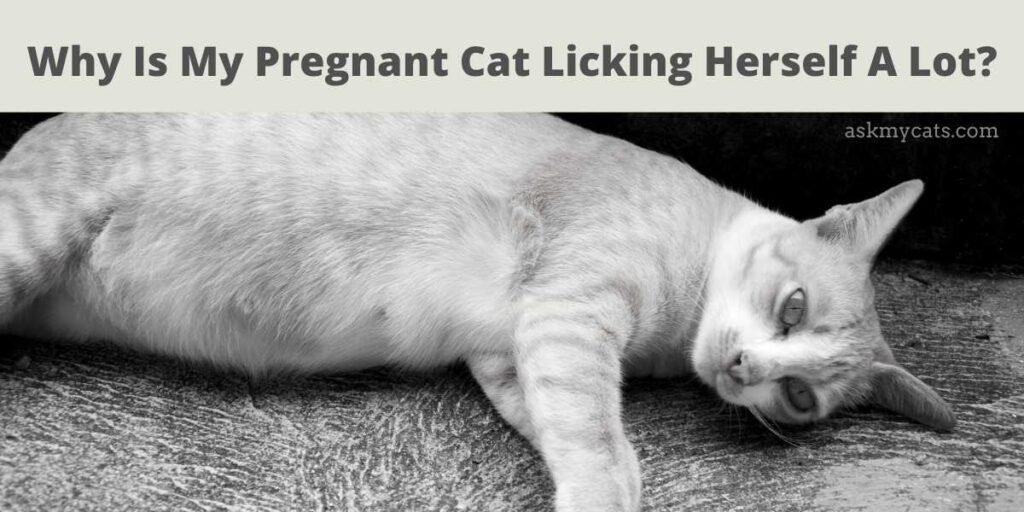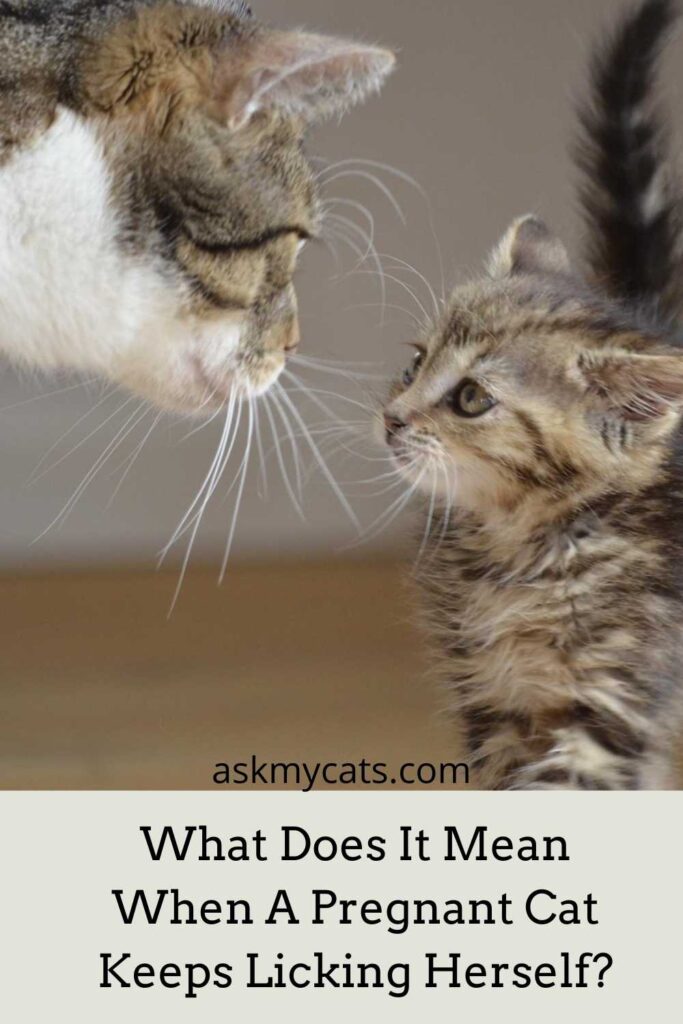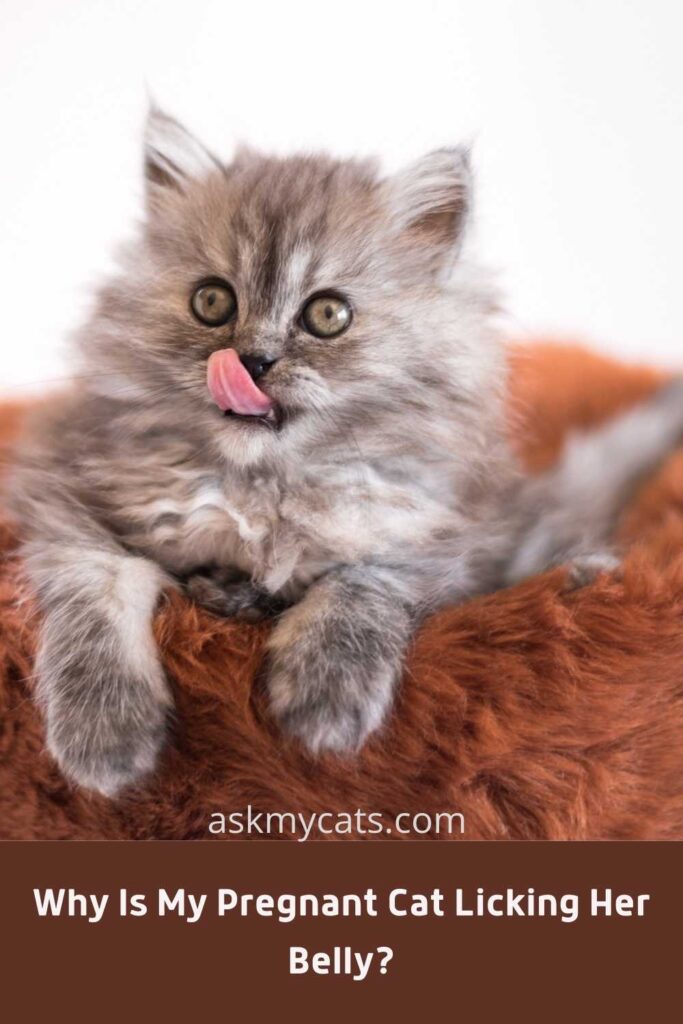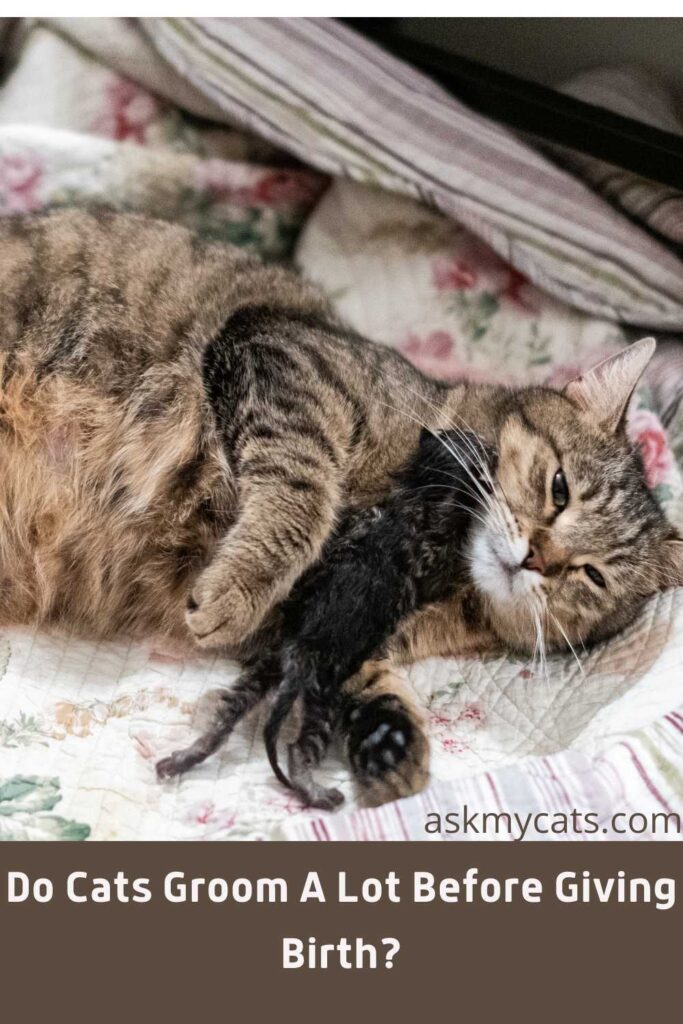My heavily pregnant cat, Snowball, started licking herself just days before giving birth to her kittens. Considering it was unhygienic behavior and some potential disease, I took her to the vet.
The doctor said that it was natural for pregnant cats to lick themselves before giving birth. This stimulates the process and makes it faster.
I was surprised to learn that’s how cats induce their delivery.
In this article, we will tell you why they do so, if it’s normal behavior, and everything related to it.
What are you waiting for?


Give Your Cat the Perfect Day
Get the Free Ebook!
Do Pregnant Cats Lick Themselves A Lot?
Yes, pregnant cats are often seen licking themselves! Your cat may lick herself excessively just before giving birth, especially in the genital area and around her lower belly.
She will lose her appetite as she gets closer to delivering her kittens.
A cat’s gestation period is 65 days or 9 weeks. As she gets closer to her parturition, your cat will whimper in agony during contractions, and you’ll see a discharge of blood or other fluids.
Your cat can puke if her rectal body temperature falls below 99 degrees Fahrenheit.
What Does It Mean When A Pregnant Cat Keeps Licking Herself?

Be ready for the auspicious occasion; your baby is going to be a mother.
Licking is a cat’s way of informing you that her kittens are on the way and will be here in just a few more hours.
Here’s how you can ensure her healthy labor:
1. It’s Time!
When your cat is going to give birth to her babies, she especially enjoys her privacy!
It is crucial to watch your cat before and during childbirth so that you can intervene if there are any issues. They go into hiding to acquire their personal space.
The queen is loud during the first several hours of labor but also gets very restless.
When your cat is in her final days of labor, keep a close check on her to make sure you know when and where she will give birth to her kittens. If you are unsure whether labor has begun, call your veterinarian.
Also, check out Do Kittens Move A Lot Before Birth? Know The Reasons!
2. Keep Things Ready
When you suspect labor is coming, it’s wise to prepare a few things in advance, such as:
- A clean bowl of warm water
- Clean towels and clothes
- Dental floss
- Disposable gloves
- Acat carrier, and
- Your vet’s details
Keep the kittens warm in case you need to separate them from their mother. Instead of using a hot water bottle because of their potentially piercing claws and teeth, use a microwaveable beanie bag.
Not to worry. Your cat should give birth without incident.
3. Delivery!
You must now assist your queen in giving birth to her kittens.
She will squat and mimic as if she is peeing while experiencing a vaginal discharge. While some kittens arrive head first, others do so feet first. This is a common occurrence for cats and is not cause for concern.
They arrive 45 minutes to an hour apart. Watch it from a distance and only get involved if required.
4. After Care
When a kitten is delivered, the mother should engage in tearing the amniotic sac before cleaning it.
If she doesn’t open the sac, go in and use a towel to gently tear open those that are still closed so the kittens may breathe. After cleaning their mouth and nose, quickly dry the kitten with a fresh cloth.
Drying and warming the kitten with a final firm rub with a warm towel will encourage it to take its first deep breath.
Why Is My Pregnant Cat Licking Her Belly?

Your cat, by the end of the 8th week of her pregnancy, starts licking her belly and genitalia to invigorate childbearing.
A cat’s process of giving birth can take up to 24 hours, and that is nothing unusual.
However, if you notice a 3-hour gap between delivering her kittens, call your vet immediately.
Basically, there are three stages to this process:
Stage 1
Make an effort to make room in your home for your cat’s nesting spot because she will eventually retire to the place where she was raised.
Your cat will start to pant and cry during this initial stage, and she will also turn down food. She might start licking her lower belly and vulva to ease the pain. This phase lasts for six to twelve hours.
Keep children and other pets outside during this period.
Stage 2
As your cat pushes the first kitten through the birth canal, you will notice her straining. This can look similar to your cat’s attempt to urinate. One or more kittens are delivered at the end of this stage.
Stage 3
For the kitten or kittens that were born during stage two, the placenta will pass during this stage. Your cat will then start over with stage two.
The latter two steps will be continued as long as she is still pregnant with her kittens.
Once the babies are brought into the world, enjoy a home full of furry babies.
Do Cats Clean Themselves Before Giving Birth?
Cats are frequently observed to clean themselves before giving birth.
Since every cat is different when giving birth, it is impossible to generalize about this event.
Some felines may wash frequently before giving birth, especially after vaginal discharge and the rupture of the mucous plug. Others sense the pressure of the impending labor activity and will constantly use the litter box.
They can not poop or pee, and this is a major indication of the start of the big event.
Do Cats Groom A Lot Before Giving Birth?

Cats groom themselves a lot before delivery. She will constantly clean her vulva and get rid of any discharge in that area.
The uterine movement- Contractions, make your cat yowl with pain.
Besides being restless, excessive vocalization is something that becomes prominent.
She paces and pants and licks herself to feel better.
What Are The Signs Of Labour In Cats?
1. Anxious
If you find your queen to be unusually nervous and fidgeting, then it may be a sign that she is ready to go into labor.
Your queen may be about to give birth if she begins acting uncharacteristically tense and anxious. This odd behavior typically begins a day or two before delivery. A pregnant cat may pace a lot to show her worry.
2. Nesting
Cats have a sense of when they are ready to give birth.
She will start looking for a peaceful, secluded, cozy environment that is dimly lit so that she can give birth and nurse her young in comfort.
3. Behavior
During this stage, some cats who are very close to their caregivers start to depend on them even more.
Even if she is usually cool and distant, when she is close to conceiving a child, she may start being loving and friendly in a way that is out of character.
Consider all the times your cat has given you love and cuddles, from headbutting you to snuggling up against your leg.
4. Obvious Licking
Your cat will start licking her vulva to clear a light discharge as her labor approaches. She’ll want to keep the area tidy, so you probably won’t see this discharge.
5. Loss Of Appetite
It’s likely that your pregnant queen had a huge appetite during her pregnancy. She will notice a sharp decline in appetite as labor approaches.
6. Vocalize
In the latter stages of pregnancy before labor, your cat, who is often calm and quiet, may also start to become noticeably louder.
Constant wailing, howling, or meowing could all be signs that labor is about to start. She can also start panting and breathing quickly, becoming hot and thirsty.
Check out more details: Pregnant Cat Keeps Meowing: Know These Reasons
Frequently Asked Questions
Can cats have delayed labor?
Contrary to humans, they are more prevalent in feral cats and have the power to suppress labor. This type of labor, known as “interrupted labor,” can last up to 36 hours.
The cat can eat and tend to the kittens who have already been delivered during this time even though it shows no symptoms of active labor, such as straining. This is a skill that cats have honed in case they have to flee from a predator.
Of course, if something doesn’t feel right, it never hurts to speak with your veterinarian.
How to know if a cat still has an undelivered baby?
The mother cat’s belly will start to shrink after she has nursed for a while.
She will contract as a result of nursing, and she should pass the afterbirth shortly after.
As mom will be cleaning her kittens constantly to encourage their digestion and bowels, she will be mindful to clean her hind area frequently as well.
You may usually gently check her abdomen and feel the bulge if the cat is still inside. Additionally, it should have some internal movement.
She will have interrupted labor or, worse yet, a lifeless kitten inside her if she doesn’t birth the last kitten within 24 hours.
Final Words
That pretty much sums up this unusual yet normal tendency of pregnant cats.
Have you ever owned a female cat? Did you go through her childbearing experience? How’d it gone?
Post a comment and let us know.
